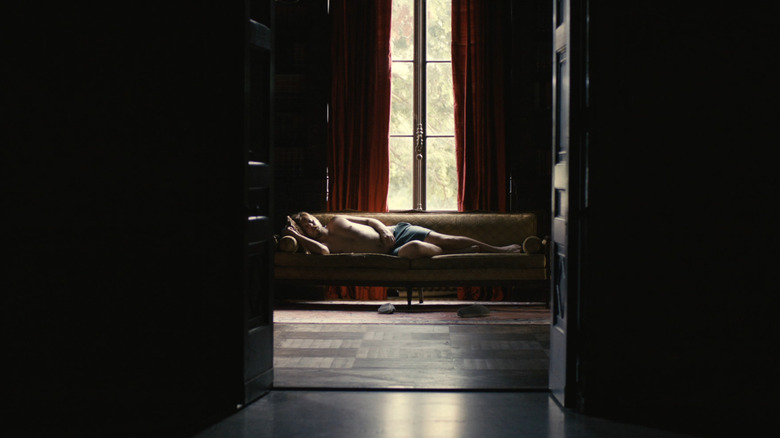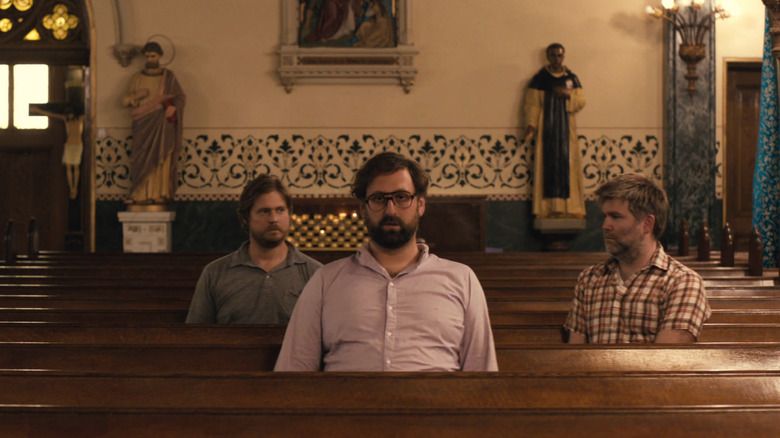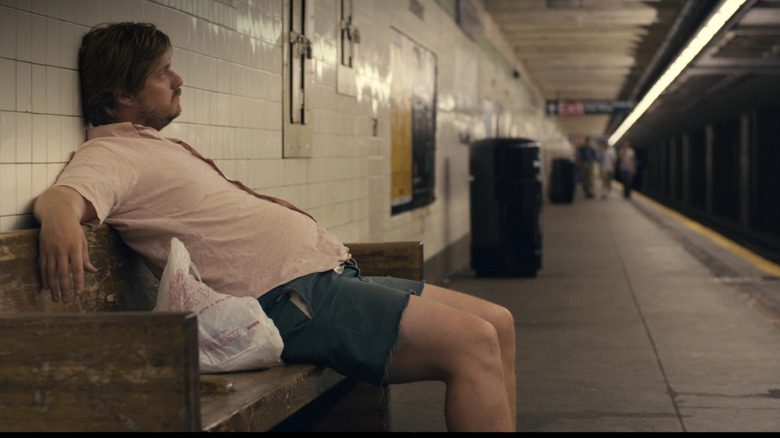
(Welcome to The Daily Stream, an ongoing series in which the /Film team shares what they've been watching, why it's worth checking out, and where you can stream it)
The Movie: "The Comedy"
Where You Can Stream It: Peacock
The Pitch: Rick Alverson is known for eschewing traditional modes of storytelling and narrative, and his filmography is basically one extended effort to subvert audience expectations and supply an alternative to mainstream cinema. His most recent film, "The Mountain," continues that project. But for me, the high point came in 2012 with "The Comedy" — a movie "about movies," according to Alverson. And when it debuted to the Sundance crowds that year, some folks were, shall we say, less than impressed.
The movie focuses on Swanson, played by alt comedy legend Tim Heidecker. The 30-something Brooklynite is completely disconnected from the world around him. He drifts through New York City in a permanent state of ironic removal from both the outside world and his own ability to feel anything beyond slight amusement at his own perverse attempts at improv. Swanson lives on a boat moored in the Hudson as he waits for his wealthy father to die and lives out what is essentially a protracted existential crisis. Capturing a very specific form of apathy embodied by exactly the kind of white, middle-class, hipster Swanson represents, "The Comedy" basically comprises a series of vignettes that add up to a stark portrait of modern day nihilism. But this movie about movies also represents Alverson's attempt to hack away at the very building blocks of filmmaking with which we're all, whether we realize it or not, so familiar.
Why It's Essential Viewing

Simply put, "The Comedy" is essential viewing because it's an important reminder of the power of film to move you in ways that go beyond being entertained, feeling vindicated, or finding comfort. In an age when mainstream movies are geared towards leveraging audience nostalgia, meeting fan expectations, and generally reinforcing existing viewpoints, Rick Alverson's film is a crucial reminder of art's singular power to challenge and subvert.
The director doesn't want you to come away from "The Comedy" feeling comfortable in any form. Andy Kaufman — soon to be the subject of a Safdie Brothers documentary — once said, "I just want real reactions. I want people to laugh from the gut, be sad from the gut, or get angry from the gut." In other words, he wanted his creativity to spark genuine emotion in his audience. With "The Comedy," Alverson taps into that most important and often overlooked function of art by presenting something truly unsettling that should leave you feeling deeply moved long after its 90 minutes are up. And by "moved," I don't mean overcome with emotion, but perturbed or unmoored in some unshakable way.
"The Comedy" is an attempt to explore a specific kind of 21st-century cultural malaise and ennui. But it's also an attempt to undermine what you expect from a movie. There is no conventional narrative, and that's the challenge Alverson is setting his audience. Not simply testing you to see if you'll make it through the runtime without the aid of a familiar structure, but whether you can reflect on your own desire for that kind of hand-holding, and what that says about the state of filmmaking and art generally. Perhaps unsurprisingly, a certain, very vocal, segment of audiences didn't care for Alverson's methods.
'The Nerve Of You'

When "The Comedy" screened at Sundance, many reviews were thoughtful and nuanced. But there was a particularly vocal contingent that were neither. Rick Alverson recently visited Tim Heidecker's "Office Hours Live" podcast where the subject of their 2012 collaboration came up. As the director recalled, after a screening he was "yelled at in the lobby by [...] a couple" whose objections evidently amounted to them "screaming" the phrase, "The nerve of you." But that was just the beginning for Alverson and the star of his indie project.
After a screening at one of the satellite theaters around the festival, the director and star held a Q&A. As Alverson recounted to Heidecker, during the post-screening session, a gentleman in the crowd stood up and said, "On behalf of the audience here, I'd like you to apologize for what we just endured." And as if that wasn't enough, the director remembered how his parents had written him a note saying, "I wish there was a better way you could have got across your point."
But it didn't stop there. Once the reviews started rolling in, that same angry sentiment seemed to rear its head yet again. Memorable quotes included David Lewis of the SFGate's assessment of "The Comedy" as little more than "a mean-spirited piece of mumblecore that tries to provoke you, but only succeeds in boring you." Meanwhile, A. O. Scott penned a harsh takedown of Alverson's film in the New York Times, where he lamented the movie "refusing to make Swanson the least bit sympathetic," and dismissed the whole thing as follows: "If you can discern any critical distance or interesting perspective here, or even a good reason to spend 90 minutes in such company, I'm afraid the joke is on you."
An Unearned Reputation

Aside from going against the very reason Robert Redford created the Sundance Institute, all of this completely unnecessary hate gave "The Comedy" a reputation as controversial, divisive, and needlessly provocative. It took on a kind of infamous notoriety as the film that had upset everyone at Sundance 2012, with journalists proudly proclaiming it to be the "first movie they'd ever walked out of." That all culminated with The LA Review of Books' Merve Emre referring to "The Comedy" as the "most-walked out film at Sundance."
But in reality, the walkouts and loud condemnations only came from a certain, particularly outspoken, group whose critiques were amplified by the press. As Tim Heidecker put it on "Office Hours":
"It got written about in a certain way where that sort of became the story of the movie. And I don't think that was fair. And I think it's lazy and there's a sense of the journalist needs to find a hook or needs to find an angle that's shocking or captivating in a way that's not necessarily reflective of the experience of the movie, thus it gives this movie this reputation it doesn't really deserve."
While this kind of hyperbolic condemnation of Rick Alverson's film must have been incredibly irritating to endure for the filmmaker and Heidecker, it also represents exactly what Andy Kaufman was talking about, and what Alverson was, I believe, aiming for. It's all a real reaction, from the gut. Whether audiences were disgusted, angered, offended, or, conversely, captivated, the film succeeded in provoking a genuine response. And that's the point.
The Soullessness Of The Comedy

In fairness, it's not difficult to see why some people were upset. Swanson is not a "likable character." He wanders various NYC neighborhoods in search of any experience that will make him feel something beyond abject numbness. His evenings are spent drinking with his equally desensitized friends (played by a host of music and comedy talent from LCD Soundsystem's James Murphy to Tim Heidecker's "Tim and Eric" comedy partner Eric Wareheim). And when he isn't harassing various New York residents, he's exploring the peripheries of language and irony by improvising obscene comedic bits.
None of this is played for laughs. While the movie often borrows the beats of comedy films, cutting to reactions of stultified onlookers, it's all performed by Heidecker with something that goes beyond deadpan delivery and ventures into a kind of haunting soullessness. At one point, Swanson brings a woman to his boat only for her to have a seizure. Heidecker manages to somehow make you believe he is truly dead behind the eyes as he surveys his date's violent spasms with nonchalance, even boredom. And as Swanson's callous acts go unchecked, there's no moment of enlightenment, catharsis, or awakening.
Throughout all of this, there's nothing recognizable as a traditional narrative, three-act structure, or character progression. Much like the film's central character, these moments just exist, passing through the present then disappearing to leave only a lingering sense of unease. There's even an attempt to subvert standard cinematic grammar throughout. Establishing shots are pretty much completely absent, with scenes starting on close-ups of characters' sullen faces and wide shots generally used sparingly in favor of a more claustrophobic visual style.
Why would any of this appeal to anyone? I'm glad you asked.
One Long Heresy

This might sound grandiose, but these are the questions "The Comedy" raises: What is the point of filmmaking? What is the point of art? Is it all just another way for us to feel validated or entertained? There's room for that, but to reduce any art form to solely those parameters is to do it a real injustice. Art has always been arguably most effective as a way of challenging tradition. It's a place where unspoken ideas find expression, and a way of exposing audiences to unfamiliar points of view. And as a counter to our friend David Lewis, art can, and even should be "boring," especially in a time where everything is designed to be stimulating and attention-grabbing.
Susan Sontag said, "The only interesting ideas are heresies." Well, as the negative reviews and walkouts prove, "The Comedy" is basically one long heresy, and as such, consistently interesting throughout. Perhaps the best way to sum it all up is by using A. O. Scott's review as a point of comparison. Think about the accepted customs of TV and film review writing. Look at that headline: "Like a Sailboat Skipper Without a Destination" — a sly reference to some element of the film itself, i.e. Swanson's sailboat. That final phrase, an allusion to the film's title: "I'm afraid the joke is on you." Get it? Because it's called "The Comedy." The irony of Scott's review is that ultimately his own writing follows familiar formulas. Rick Alverson, on the other hand, is mainly concerned with subverting standard formulas and committing "heresies."
Yes, "The Comedy" can drag in places, and it's not going to leave you feeling good about anything. But it will leave you feeling. And that's the point, if there is one.
Read this next: The 15 Best Comedy Movies From Black Directors
The post The Daily Stream: The Comedy's Notorious Reputation Is Completely Unearned appeared first on /Film.
0 Commentaires